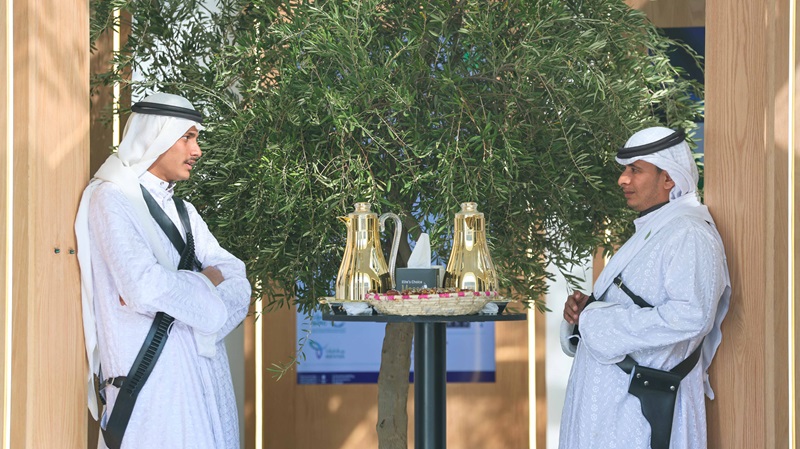Governments have failed to agree on a global mechanism for tackling drought at a United Nations conference in the Saudi capital of Riyadh, despite warnings from scientists of an environmental crisis unfolding beneath our feet.
Talks at the COP16 conference of the UN Convention to Combat Desertification (UNCCD) took place behind closed doors, but sources told Climate Home that, while Africa pushed hard for a legally binding drought protocol, the United States and others were opposed.
The host nation, Saudi Arabia, gavelled the summit to a close in the early hours of Saturday morning after the stalemate dragged the talks into overtime. Further debate was postponed to COP17 in 2026, which will take place in Mongolia.
“Parties need more time to agree on the best way forward as to how to address the critical issue of drought,” the UNCCD’s executive secretary Ibrahim Thiaw said at the closing session.
The delay jarred after a warning from scientists that three-quarters of the Earth’s land has become permanently drier over the past 30 years due to human activities and climate change. If the trend continues, it could lead to food shortages, increasing wildfires, large-scale forced migration and other devastation, the UNCCD report said.
But, at talks which attracted more attention than any of the previous bi-annual ‘land COPs’, governments did agree to establish official groupings for Indigenous peoples and local communities and to extend the UNCCD’s remit beyond drylands to cover pastoralism and the rangelands that make up half the Earth’s land surface.
Drought ‘sticking point’
The UNCCD is one of the three “Rio Conventions” born out of the Earth Summit in Rio de Janeiro in 1992 to address environmental and development issues globally. The other two are the United Nations Framework Convention on Climate Change (UNFCCC) and the Convention on Biological Diversity (CBD).
On the opening day of COP16, just a few kilometres away from Saudi Arabia’s vast desert, an intergovernmental working group on drought put seven policy options on the table. They ranged from a legally binding protocol to a non-binding “global framework”. The draft protocol mentioned “provisions on resource mobilisation and financial mechanisms.”
The African Group’s president Khalid Cheriki told Climate Home before the negotiations began that the finance mobilised to deal with drought is “not sufficient” and that the group, which negotiates on behalf of African countries at the talks, “has been advocating for a legally binding protocol for drought for many years”.

The COP16 UNCCD talks took place in Riyadh in December 2024 (Photo: Anastasia Rodopoulou/IISD ENB)
Governments opposed to this position – including the United States, EU and Argentina – said they supported alternative solutions within the scope of existing frameworks, according to the Earth Negotiations Bulletin, a reporting service on UN environment and development negotiations.
A US government spokesman said publicly at COP16 that “a new international agreement to address the issue of drought is not the best approach. Droughts have local causes and as such do not require collective action. A one-size-fits-all global policy is not the most effective response.”
A US State Department spokesperson told Climate Home after the summit that the US had “joined with many other governments” in opposing a legally-binding drought agreement. They added: “We need action now and it would take years to negotiate a new agreement. We had proposed – and many parties strongly supported – developing a comprehensive framework to build drought resilience at all levels.”
Tell us your top three climate issues for 2025! We’ll share the results in the New Year
Jes Weigelt, managing director of think-tank TMG Research, who tracked the talks, said many countries outside Africa “see the preparatory process to develop such a protocol as being too resource-intensive and argue for using these resources to fight the impact of droughts.”
He told Climate Home that drought was a “sticking point” at the last COP in Côte d’Ivoire and questioned why the two years since were not used more effectively to find a compromise. “We are losing precious time,” he said.
Resilience fund
Nonetheless the summit did see some progress on finance. On its first day, the Riyadh Global Drought Resilience Partnership was launched, which aims to support 80 of the poorest nations in dealing with drought.
It attracted pledges of over $12 billion. Of this, $10 billion was offered by a coalition of Gulf-based development finance institutions called the Arab Coordination Group, as well as $1 billion each from the Islamic Development Bank and the OPEC Fund for International Development and a further $150 million from the Saudi Arabian government.
Saudi Arabia’s deputy minister for the environment, water and agriculture Osama Faqeeha said in a statement the partnership “will serve as a global facilitator for drought resilience, promoting the shift from reactive relief response to proactive preparedness.”
But this $12.15 billion is less than 0.5% of the $2.6 trillion that the UNCCD estimates is needed by 2030 to finance action against drought and land degradation.
Indigenous win
While it failed to reach agreement on a headline drought mechanism, the COP16 conference did approve 39 decisions, including to establish a “Caucus of Indigenous Peoples” and a “Caucus of Local Communities”.
Estrella Penunia, secretary-general of the Asian Farmers’ Association for Sustainable Rural Development, told Climate Home that these two groups would ensure peoples’ voices from those groups “can be always heard and considered in the UNCCD processes”.
The world is getting smaller for pastoralists facing multiple threats
In addition, governments agreed to extend the UNCCD’s remit beyond drylands to cover grasslands, shrublands, woodlands, savanna and tundra. These types of terrain are collectively known as rangelands and include everything that is not forest, lake, sea, rocks and ice.
Praveena Sridhar, chief technical officer of Save Soil, said this change was “very significant” as rangelands cover 70% of agricultural land and half of the Earth’s land surface.
Pastoralism, the herding of livestock, was also added to the UNCCD’s remit. Weigelt of TMG Research said pastoralists are “marginalised” and this decision is an “important step” to change the perception that they are “backward or incompatible with dominant ideas of development”.
While not attracting the numbers of the climate and nature COPs, the Riyadh talks included more participants and gained a higher profile than previous land COPs. The UNCCD’s chief scientist Barron Orr said land degradation had got less attention because of a lack of “iconic” images, while urbanisation means people interact with the soil less and many see it as “someone else’s problem”.
But land degradation affects everyone, and we can all help to stop it, Orr argued.“The clothes you’re wearing and I’m wearing, the coffee we drank this morning, probably contributed to land degradation somewhere else in the world,” he added.
Xiaoying You’s travel, accommodation and food was funded by Saudi Arabia’s COP16 Presidency.
This article was updated on 18th December to include the US State Department spokesperson’s statement
